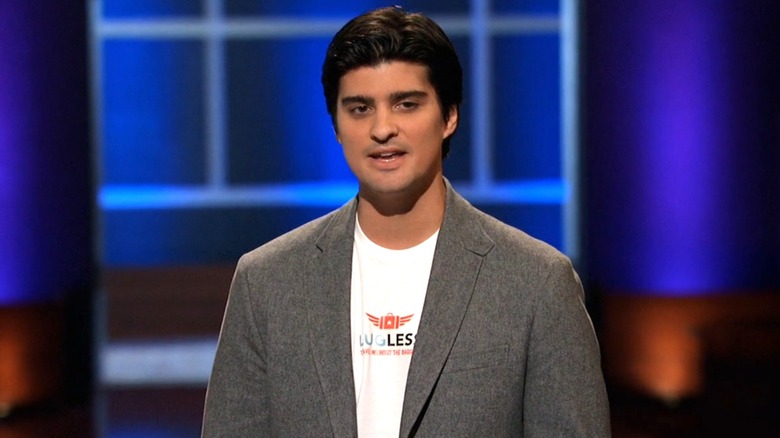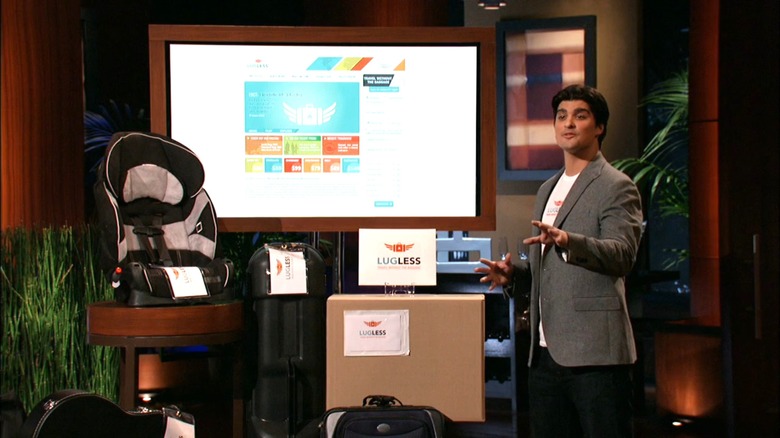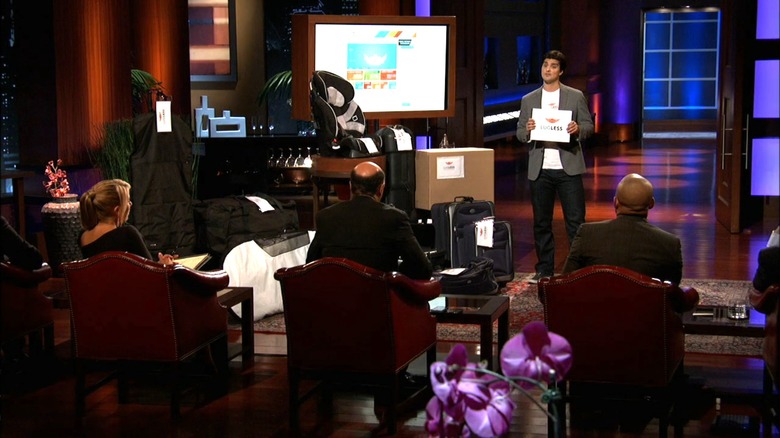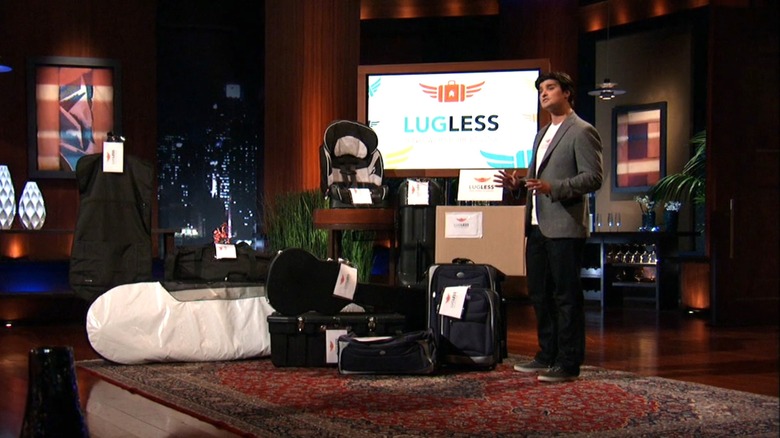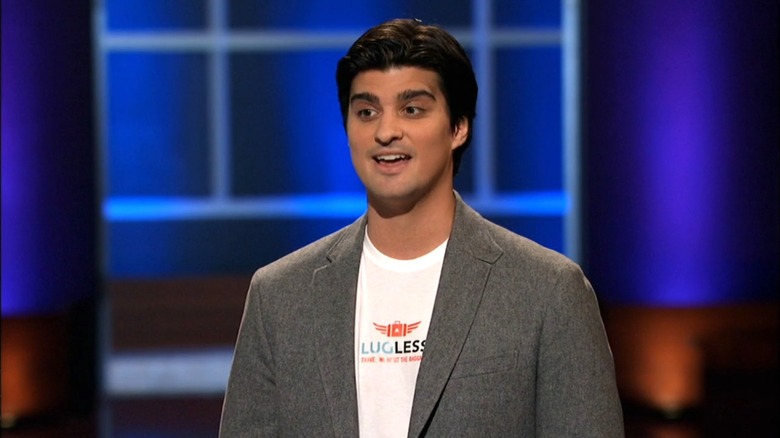What Really Came Of LugLess From Shark Tank?
From Trunkster Smart Luggage to Cincha Travel Belts and Bags, "Shark Tank" is no stranger to interesting travel pitches. And back in 2013, Brian Altomare appeared on Season 4, Episode 26 of the show with a whole lot of hope and a very unique business idea. While on air, Altomare pitched his company, LugLess, in two minutes to the panel of sharks. The young entrepreneur explained that LugLess picks up luggage from their customers' homes and delivers them conveniently to their destinations. To any audience member who has had to deal with the costs and hassles of a checked bag, LugLess sounded like a saving grace.
At least, that's what we thought. The sharks weren't exactly impressed by the idea and snubbed it without any offers. Altomare later told Fox News Radio that he thought the judges misunderstood his business idea. Despite this brutal experience, LugLess is still up and running today, and it appears that the company didn't actually need an investment from the sharks to find the success Altomare was looking for.
What happened to LugLess on Shark Tank?
When Brian Altomare — a young, bright-eyed entrepreneur — appeared on "Shark Tank," he was nervous to bits. During a live interview with Vipp Jawsal on Fox News Radio, Altomare revealed that Mark Cuban and Daymond John sniggered at him from afar before the cameras started rolling. This was likely not the most encouraging boost of confidence before having to deliver a proposal. Despite this, Altomare moved through his pitch.
Altomare shared that with LugLess, you wouldn't have to worry about getting to the airport early for a checked bag or juggling heavy items, and you wouldn't have to pay the overpriced fees that airlines charge for checked belongings. Again, as avid travelers, we think this would be a godsend. The sharks, on the other hand, didn't think so.
They looked at Altomare with scrutiny in their eyes. Robert Herjavec remarked snidely, "Brian, hasn't this been done before? It's called FedEx." Ouch. Mark Cuban shook his head, saying that the business model needed to be completely reworked so the service was fast and inexpensive. The sharks didn't bite, but they did a vicious job of intimidating Altomare.
LugLess after Shark Tank
Although the panel of sharks gave LugLess a unanimous "no," the "Shark Tank" audience appeared to give it a resounding "yes." It turned out that there are a lot of people who will pay money to not have to deal with their luggage before and after check-in. Within 30 days of the episode airing, LugLess saw its monthly revenue increase by over 400%. Brian Altomare had appeared on the show offering 10% equity in the company for a $100,000 investment. Although he didn't leave with what he had originally hoped for, Altomare believes the publicity that LugLess got was tremendously valuable.
In an email he sent to CNBC, Altomare shared that the rejection from the sharks had initially devastated him. He even experienced panic attacks as a result of his appearance on the show. But, in retrospect, Altomare said he believes ″['Shark Tank'] opened doors for us and allowed LugLess to be a brand people want to know more about." Just a year later in 2014, the company was listed in Entrepreneur Magazine's list of "100 Brilliant Companies."
That same year, they got a call from Luggage Forward. The Boston-based, well-established luggage delivery company acquired LugLess that December. In a statement provided to PR News Wire, Brian Altomare remarked, "LugLess is thrilled to join Luggage Forward and its family of luggage delivery brands. We are excited that even though 'Shark Tank' did not bite, Luggage Forward did."
Is LugLess still in buisness?
Today, LugLess is still in business, providing lower costs than ever for luggage delivery. In an interview with Yahoo Finance, Altomare explained that "Shark Tank" provided useful criticism for their company model. At the time, LugLess was suited for wealthier customers only. During the interview, Altomare was proud to share that the company's new technology and decreased prices have made LugLess accessible to a much broader range of travelers. Surprisingly enough, he added that LugLess now actually partners with FedEx and UPS. That's one way to spin your weakness into a strength.
In a verified review on Trustpilot, one customer wrote "So easy! We made a 2 part trip to Hawaii and then Los Angeles for a wedding- shipped our wedding clothes ahead to a family member's house so we didn't have to drag it to Hawaii. Bags arrived early and drop off at FedEx was seamless. Will definitely use again!" There are over 10,000 other five-star reviews similar to this one. Overall, Trustpilot reveals that out of 14,000+ reviews, the luggage shipping company has received an impressive average of 4.5 stars out of 5.
What's next for LugLess and its founders?
Making travel more convenient and less of a hassle will always be relevant. LugLess' track record has continued to prove this to be true. In 2024, the company is still in business. In fact, it even gained an extra boost in business from the pandemic in 2020 as customers looked for a way to reduce contact with strangers.
Today, LugLess offers additional add-ons like front door pick-up and extra insurance coverage. Another feature offers live support from their customer service to soothe any anxieties that a tracking page can't. In addition to expanding its delivery services, the company has upped its content game, offering a blog with travel content.
While appearing on the podcast Inside Transportation in 2021, co-founder Aaron Kirley shared that LugLess was working on smoothing out complications with label printing and was brainstorming how to continue decreasing the price of luggage delivery. In addition, they have begun developing partnerships with hotels and airlines.
As for Brian Altomare, he is still working as a leader for the LugLess team, serving full-time as the Business Development Director. In 2024, he gave an interview to The Sun, explaining how LugLess exploded by 500% after "Shark Tank" and now has a userbase of 250,000 travelers. He was also somewhat critical of the sharks, saying that they didn't understand his idea because they don't "walk in the same shoes" as the common man. "The consumers understood the pain points," Altomare said, "the judges missed an opportunity to be part of something which changes the way people travel."
